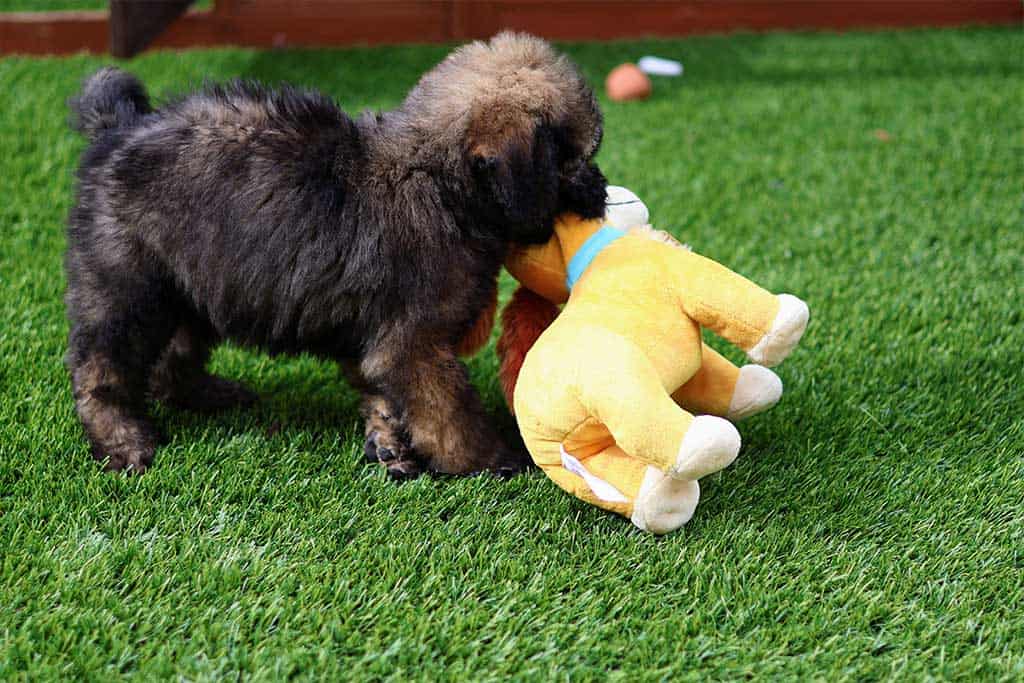Teething is one of the crucial phases of raising a doodle puppy. You need to understand the whole teething process to prevent overcrowding of teeth and other problems.
Teething marks the beginning of entering into adulthood, just like the shedding of baby hair. Like other doodle parents, you desperately want to know when teething will stop. Do not worry; you have come to the right site for answers.
This article explains everything you need to know about the teething process in Goldendoodles. Read it to answer this: when do Goldendoodles stop teething, and how can one assist them?
When do Goldendoodles Stop Teething? – Discover Goldendoodles Teething Phases
Like most people, you are here to look for answers to this question: when do Goldendoodles stop teething? When the dog reaches eight months old, it should have all the adult teeth. Before it develops the adult teeth, how does it lose its baby teeth? How long do Goldendoodles teeth? Below are the teething phases and timelines:
1. Development of Baby Teeth – Two to Four Weeks Old
Goldendoodle puppies have no teeth when they are born. These start to emerge when the puppies reach two weeks. Two weeks later, they have a set of sharp baby teeth. The set has twenty-eight sharp and tiny teeth. These sharp and small teeth allow the dogs to breastfeed and learn to chew solid food.
2. Teeth Start to Fall Out – Three to Six Months
When do Goldendoodles stop teething? The baby teeth begin falling out when the puppy is three to six months old. These sharp and small teeth grow weak and loose like those of toddlers. Then, they fall off naturally.
You need to watch your pet closely during this teething phase. Soon after a tooth slides out of its socket, another will grow in the same spot. You may find needle-like teeth everywhere in your house. As baby teeth fall off making room for adult teeth, ensure you participate.
Some baby teeth may remain in the gum while the adult ones grow in the same area. Overcrowding of teeth is popular in this phase of teething in doodles. If you notice this problem, take the pet to the veterinarian for teeth extraction. So, when do Goldendoodles lose their puppy teeth? You now know they do so within the age of three to six months.
3. Growth of all Adult Teeth – Six to Eight Months
As earlier noted, the teething process ends by the eighth month. The dog will have lost all its baby teeth at six months old. From six to eight months, the Goldendoodle will have a set of forty-two adult teeth. This is also the time when Goldendoodles switch from puppy food to dog food, as their nutritional needs change to support their continued growth and energy levels as adult dogs.
As you noticed above, the baby teeth are twenty-eight. That means adulthood offers the dog fourteen more teeth. These are strong permanent teeth. The Goldendoodle will use them for chewing and crushing down food. Adult teeth are longer than baby teeth and come in varied shapes and sizes.
Your dog will have front teeth called incisors and canines that will help it tear and cut food. It will also have bigger premolars and molars for crushing and chewing food. A dental examination is necessary by around the eighth month to ensure all the teeth have grown.
The veterinarian will check if your dog has dental issues that require immediate attention. After this dental visit, you should start a teeth-caring routine for your dog.
What Symptoms Signify Teething in Doodles?
When do Goldendoodles stop teething, and what are the signs? At eight months old, you will have a dog with adult teeth. Before getting there, you will have noticed signs of teething. Here are the signs of teething in Goldendoodles:
Unavoidable Urge to Chew
If your doodle puppy seems to chew on anything it finds, it might be experiencing the teething process. If you do nothing to help, the dog might damage your household possessions, including furniture and shoes. Keep your finger away to avoid a sharp bite. Like human babies, puppies feel pressure and discomfort in the gum. This only gets better when chewing something. So, provide dog toys for teething pets so they can feel better.
Drooling
Drooling in dogs is normal. However, you might notice more drooling when the dog starts teething. Drooling allows the body to lubricate the gums and the growing adult teeth. Clean up the dog’s mouth once you see the drool. Place a moisture-resistant mat on its feeding and sleeping area.
Gum Swelling and Redness
When do Goldendoodles stop teething, and how can I deal with swollen or red gums? Gum swelling and redness are the most straightforward signs of teething in puppies. The easiest way to notice this sign is to examine the puppy’s mouth. As the new teeth emerge, they exert pressure on the gum. That is why it swells and reddens. Only your veterinarian can offer a perfect solution for swollen or reddened gums. If the problem seems mild, apply a teething gel to reduce the inflammation. Ensure the gel is safe for doodles.
Moodiness
Goldendoodles are some of the happiest puppies to have around. Nevertheless, their mood could suddenly change during the teething process. They might become more irritable because of the pressure and discomfort they feel in their gums. Cuddle with your pet, leave it alone if it does not want to play, and offer dog toys to chew on. If your pet becomes irritable for long, take it to the veterinarian. Prolonged moodiness could mean your dog has an impacted tooth or even a painful dental infection.

How to Help Your Teething Goldendoodle
Now you know the answer when Goldendoodles stop teething. Next, take good care of your puppy to relieve its discomfort during teething. Check these simple methods:
- Get some durable chew toys made for teething dogs. Ensure the toy’s construction material has no toxins and that the item can fit in its small mouth. Choose toys with different textures to alleviate gum pressure and pain.
- Offer your puppy some cold treats. The best choices are things like frozen carrot sticks and teething treats.
- Apply teething gel on swollen or reddened gums. Ensure the gel is dog-safe and vet-approved. First, apply it to a small area to see the reaction.
- Create a dental routine that includes regular veterinary visits. This will help you care for your dog’s adult teeth at home and have it seen by its physician to eliminate any issues early.
Conclusion
When do Goldendoodles stop teething? We hope this article has answered this question the way you expected. Teething is a challenging time for the pet itself and its owner. Now you understand the phases of teething and how to help your pet. Consult your veterinarian about anything you do not understand about your dog’s teething process.





